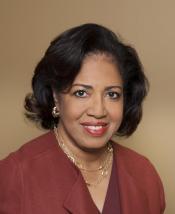
Women in Energy: Vicky Bailey
Every month we feature a women in energy that has shown exemplary leadership. We want to showcase her story and what she has done to get to where she is today. These women come from diverse backgrounds and roles; they bring with them a unique perspective to gender equality within the energy sector.

Vicky Bailey
Director
Battelle Memorial Institute
Vicky A. Bailey brings to any position over twenty years of high level, national and international, corporate executive and governmental experience in energy and regulated industries. Now an energy industry entrepreneur, Ms. Bailey has demonstrated leadership as a state and federal regulator, a public utility corporate executive and as the leading international official for the US Department of Energy. In these roles she has been at the forefront and the intersection of energy and environmental policies at both the private and governmental arenas. Her counsel and expertise continues to be relied upon by policymakers in both the private and public sector.
Most recently, in the private sector, she has been involved as an entrepreneur and principal of BHMM Energy Services LLC, a certified minority owned energy facilities management organization, as well as the president of the Anderson Stratton International LLC management consultants in domestic and international energy industries. Ms. Bailey’s executive experience includes President and board member of PSI Energy, Inc., Indiana’s largest electric utility and subsidiary of the holding company Cinergy Corp., now Duke Indiana.
Ms. Bailey’s governmental career included presidential appointments by President George W. Bush as the first Assistant Secretary for both Policy and International Affairs (2001-2004) of the U.S. Department of Energy and an earlier appointment by President William J. Clinton to the office of Commissioner (1993-2000) on the U.S. Federal Energy Regulatory Commission (FERC). Both appointments were followed by the required U.S. Senate confirmations. As the Assistant Secretary she served as vice chairman of the International Energy Agency (Paris, France) and also chaired several bilateral international working groups among energy producing nations gaining her international experience and stature in energy. While a FERC commissioner she was an architect of wholesale open access policies leading to the creation of regional competitive power markets. She is still often quoted for saying that “efficient markets are stronger regulators of goods and services than government.” Earlier in her public sector career she served multiple terms as Commissioner on the Indiana Utility Regulatory Commission following successive appointments by Governor Robert D. Orr and Governor Evan Bayh. During her long tenure as an Indiana regulator she gained experience and a national reputation for fairness in the regulation of the electric, natural gas, telephone, water and trucking industries.
Most recently, Ms. Bailey was appointed by Secretary of Energy Steven Chu to the Blue Ribbon Commission on America’s Nuclear Future. The Commission will conduct a review of policies for managing the back end of the nuclear fuel cycle, including alternatives for storage, processing, and disposal of civilian and defense used nuclear fuel, high-level waste, and materials derived from nuclear activities.
Currently Ms. Bailey’s corporate activities include directorships on the boards of EQT, Inc., Cheniere Energy, Inc., and Battelle Memorial Institute. Ms. Bailey holds a top secret clearance. She is a former director of Scottish Power PLC, in the UK, NERC, and Cleco Corp. She has current board memberships on the Girl Scouts Council of the Nation’s Capital (GSCNC), Resources for the Future, and she serves as Chair of the United States Energy Association.
Ms. Bailey is a graduate of the Purdue University’s Krannert School of Management having obtained a Bachelor of Science in Industrial Management and recently a Distinguished Alumni Award. Also, she graduated from the Advanced Management Program, The Warton School, University of Pennsylvania.
Interview
Question: How has your education and career path led you to where you are now?
Answer: I received my undergraduate degree at Purdue University’s Krannert School of Management with the anticipation of being involved in corporate America. This foundation helped me to be offered a job at Owens Illinois Glass Company as a Labor Relations Trainee. This started my career when I graduated from Purdue. I must say though that you have to allow for a little serendipity as you make plans for one thing and end up going down another path. My work there gave me a greater understanding of the importance of energy in these industries. Then I returned home to be the Assistant Admissions Officer at the Indiana School of Medicine. While there I took a bit of a detour and got married. My husband was very involved in local politics and businesses which got me more focused in the political arena and the need to participate so that voices can be heard. I heard of a vacancy at the Indiana Public Service Commission, not really knowing what the position was for, but my husband thought I should go for it. I put my name in and subsequently was chosen to be a Commissioner on the Public Service Commission in 1986. So that is how I got started in the energy field as more of a political process program at the time. I was the only female Commissioner on the Board at the time and the first African American female to be on the Commission. At times, this made me wonder how do I fit in and what do I say that has substance, meaning, and will make an impact. You are so busy trying to choose your words so carefully that sometimes you end up saying nothing at all and the last thing you want is to not have a voice. So for women, I would say that it is so important to find your voice and be comfortable in participating. So that may mean getting out of your comfort zone and give voice to your thoughts and ideas and know they are important because you are there for a reason. I had to know that I was at the Commission for a reason and representing those that are inarticulate and unable to be at the table. I was at the table and I needed to be heard. Often times I find that allowing yourself to be in a continuous learning mode makes you more comfortable with your knowledge base as well. I have attended many workshops and conferences over the years to sharpen my skills and understanding of utility regulation, public policy and board governance. Recently, I graduated from the Advanced Management Program at the Wharton School which helped to bolster my financial and business acumen for the environment that businesses have to operate in today.
Question: Over your career, have you witnessed changes within your organization to promote more women into leadership positions?
Answer: As part of the Boards I sit on, there has been an increase in women in leadership. Two of the Boards made a conscience effort to add women to senior levels within their organizations and address some of the gaps with the lack of diversity. I have witnessed changes in the increased number of women as Board members and companies making the effort to ensure women have the opportunity to serve.
Question: Technology is pushing the traditional utility business model, from renewables, grid modernization and smart meters to data analytics. Utilities that view potentially disruptive threats as opportunities will remain relevant to their customers and can create new revenue streams. Data shows links between diversity, quality, and innovation. What is your organization doing to attract, retain, and promote more women into senior management positions to respond to the dramatic industry transformation?
Answer: My organization is looking to attract women by looking into different arenas such at STEM and others that may have not come up through a traditional path geared to energy. Consider hiring women entrepreneurs, ex-military, and academics for diversity within their recruitment at universities and with their vendors. Organizations need to constantly assess their companies’ needs to make sure they are being met. If those in senior level positions constantly ask for diversity within the organization; the CEO will pay attention.
Question: Are talented women within your organization making it to top leadership positions? Why/why not?
Answer: I would have to answer both yes and no. Yes, because many CEO’s recognize the importance of a diverse management group. Seeing women and minorities in senior roles is important for recruitment. No, because in the highly technical fields women are still under-represented but fortunately the numbers continue to steadily increase.
Question: Based on a report published by the Association of Chartered Certified Accountants and the Economic Social Research Council, “Research suggests that gender diversity facilitates better decision making, greater independence, better adherence to corporate governance, less insolvency, greater innovation and creativity, and less ‘group-think’ where members of similar backgrounds can tend to ignore alternative views or concerns, leading to flawed decision making.” What is your organization doing to bring more women onto the board?
Answer: Most businesses recognize that diversity is good for business. Different perspectives result in better decision making. If in business your consumers represent a wide spectrum in terms of diversity than that should also be reflected on your Board.
Question: Companies that embrace diversity outperform their competitors. What type of diversity programs does your organization have in place to mentor future women leaders? How does your organization measure and report gender diversity? Is the data publicly available?
Answer: Currently only one company that I serve on the board of has developed a Diversity Scorecard as part of their reporting. While it is not publicly available it can be requested. The other corporate Boards that I serve on have not yet fully developed their diversity programs or measures on reporting gender diversity though there is diversity on the board of directors. Regarding mentoring future women leaders, forums need to be developed for women within the energy sector to learn from each other and to pool their resources to ensure their numbers continue to increase on Boards and within upper management.
Question: What actions should the sector be focused on to accelerate change, increase diversity, and foster a better gender balance in the boardroom?
Answer: I think this takes a two pronged approach. First greater focus should be given at the various educational arenas (universities, academia, STEM) to encourage students to seek positions within the energy sector. Identify STEM fields to interview candidates for positions within the energy sector by ensuring that the selection of qualified individuals from finance to operations is already being vetted from a group of diverse individuals from the onset. Secondly diversity goals have the most impact when tied to performance goals hence compensation for CEOs and senior level management so that there is an incentive for them to meet specific targets. Boards may need to utilize outside services to develop a gender score card to identify deficient areas within their organization and make efforts to change them.
